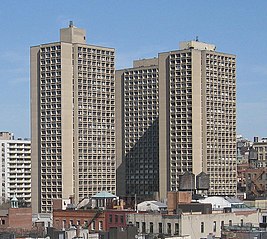University Village (Manhattan)
| University Village | |
|---|---|

The Silver Towers and 505 LaGuardia Place
|
|
| General information | |
| Type | Housing |
| Location | Greenwich Village |
| Coordinates | 40°43′39″N 73°59′58″W / 40.72761°N 73.99939°WCoordinates: 40°43′39″N 73°59′58″W / 40.72761°N 73.99939°W |
| Construction started | September 1964 |
| Completed | 1966 |
| Opening | 1967 |
| Cost | $12,500,000 |
| Owner | New York University |
| Height | |
| Roof | 275 feet (84 m) |
| Technical details | |
| Floor count | 30 |
| Floor area | 612,000 square feet (56,900 m2) |
| Design and construction | |
| Architect | James Ingo Freed & I. M. Pei |
The University Village is a complex of three apartment buildings located in Greenwich Village in the Lower Manhattan-part of New York City. The complex is owned by New York University and was built in the 1960s as part of the University's transition to a residential college. One of the towers, 505 LaGuardia Place, is a co-op that does not house students, and the other two towers, Silver Tower I and Silver Tower II, house faculty and graduate students of NYU. The buildings were designed by modern architects James Ingo Freed and I. M. Pei, and the central-plaza contains a sculpture by Carl Nesjär and Pablo Picasso. In 2008 the complex was designated a New York City Landmark by the Landmarks Preservation Commission.
In 1953 the Mayor’s Commission on Slum Clearance designated three superblocks in the Greenwich Village-area for redevelopment under Title 1 of the Housing Act of 1949. The project was known as the Washington Square Southeast redevelopment area, with the northernmost superblock given to NYU for educational purposes and the lower two superblocks to the Washington Square Village Corporation. The northern superblock eventually became the site of several NYU buildings, including the Bobst Library, Tisch Hall of the Stern School of Business, and Warren Weaver Hall. However, poor sales of apartments in the central superblock's Washington Square Village buildings led the Corporation to sell the southernmost superblock to NYU in 1960. As part of the sale, NYU was required to develop 175 units of low-income housing on the site.
...
Wikipedia
